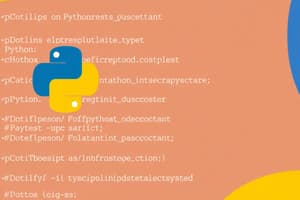Podcast
Questions and Answers
What is the purpose of the print() function?
What is the purpose of the print() function?
- To import external libraries
- To define a block-level structure
- To iterate over a sequence
- To output text to the screen (correct)
What type of data is represented by 3.14?
What type of data is represented by 3.14?
- String
- Float (correct)
- Boolean
- Integer
What is the purpose of an if-else statement?
What is the purpose of an if-else statement?
- To import external libraries
- To iterate over a sequence
- To execute code conditionally (correct)
- To define a reusable code block
How do you access individual elements in a list?
How do you access individual elements in a list?
What is the purpose of the def keyword?
What is the purpose of the def keyword?
What is the purpose of the import keyword?
What is the purpose of the import keyword?
Flashcards are hidden until you start studying
Study Notes
Basic Syntax
- Indentation: uses spaces (not tabs) to define block-level structure
- Comments: start with
#and extend to the end of the line - Print function:
print()is used to output text to the screen
Data Types
- Integers: whole numbers, e.g.
1,2,3, etc. - Floats: decimal numbers, e.g.
3.14,-0.5, etc. - Strings: sequences of characters, e.g.
"hello",'hello', etc.- String concatenation:
+operator, e.g."hello " + "world" - String formatting:
%operator, e.g."hello %s" % "world"
- String concatenation:
- Boolean: true or false values
- Lists: ordered collections of items, e.g.
[1, 2, 3],["a", "b", "c"]- Indexing: access individual elements with
[], e.g.my_list[0] - Slicing: access a subset of elements with
[], e.g.my_list[1:3]
- Indexing: access individual elements with
Control Structures
- If-else statements: conditional execution of code
- Syntax:
ifcondition:codeelifcondition:codeelse:code
- Syntax:
- For loops: iterate over a sequence
- Syntax:
forvariableinsequence:code
- Syntax:
- While loops: repeat code while a condition is true
- Syntax:
whilecondition:code
- Syntax:
Functions
- Defining functions: create reusable code blocks
- Syntax:
deffunction_name(parameters):code
- Syntax:
- Function calls: execute a function with arguments
- Syntax:
function_name(arguments)
- Syntax:
Modules
- Importing modules: load external libraries
- Syntax:
importmodule_name
- Syntax:
- Module functions: access functions from a module
- Syntax:
module_name.function_name(arguments)
- Syntax:
Basic Syntax
- Indentation is defined using spaces, not tabs, to create block-level structure
- Comments start with
#and extend to the end of the line print()function is used to output text to the screen
Data Types
Integers
- Whole numbers, e.g.
1,2,3, etc.
Floats
- Decimal numbers, e.g.
3.14,-0.5, etc.
Strings
- Sequences of characters, e.g.
"hello",'hello', etc. - String concatenation:
+operator, e.g."hello " + "world" - String formatting:
%operator, e.g."hello %s" % "world"
Boolean
- True or false values
Lists
- Ordered collections of items, e.g.
[1, 2, 3],["a", "b", "c"] - Indexing: access individual elements with
[], e.g.my_list[0] - Slicing: access a subset of elements with
[], e.g.my_list[1:3]
Control Structures
If-Else Statements
- Conditional execution of code
- Syntax:
ifcondition:codeelifcondition:codeelse:code
For Loops
- Iterate over a sequence
- Syntax:
forvariableinsequence:code
While Loops
- Repeat code while a condition is true
- Syntax:
whilecondition:code
Functions
Defining Functions
- Create reusable code blocks
- Syntax:
deffunction_name(parameters):code
Function Calls
- Execute a function with arguments
- Syntax:
function_name(arguments)
Modules
Importing Modules
- Load external libraries
- Syntax:
importmodule_name
Module Functions
- Access functions from a module
- Syntax:
module_name.function_name(arguments)
Studying That Suits You
Use AI to generate personalized quizzes and flashcards to suit your learning preferences.




